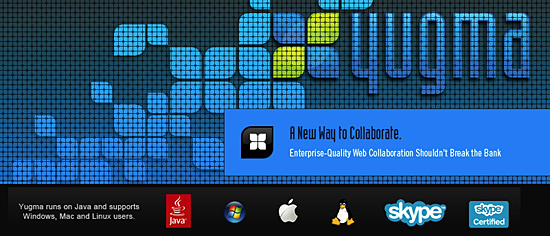 In a time when the global economy is still in a relative holding pattern, gas prices remain high and more of us are turning to internet-based products and services to meet our needs less expensively and with more power, I assumed that Yugma‘s strong value proposition and rock-solid technology would be ones that would carry them quickly toward profitability.
In a time when the global economy is still in a relative holding pattern, gas prices remain high and more of us are turning to internet-based products and services to meet our needs less expensively and with more power, I assumed that Yugma‘s strong value proposition and rock-solid technology would be ones that would carry them quickly toward profitability.
Turns out that’s not the case.
Though I consulted with Yugma in 2006 and learned first-hand how many competitive offerings there are in the screensharing and web conferencing space, I still was enamored by Yugma and its cross-platform support, along with the ease of use they built in to using it. I’ve kept tabs on their progress for the last couple of years, taking great pains to not write about challenges and difficulties they were facing which I’d learned previously from founder Lingaraj Mishra, since confidences are a key part of my value system and an obvious imperative for the management consulting work I do with clients (i.e., I keep my mouth shut).
An unfortunate turn of events occurred recently when a letter to shareholders was publicly outed by WebConferencingTest and they did this press release stating why they were removing Yugma from their rankings (which I learned about today via this post at SkypeJournal and then learned more from this article at TMCNet).
I reached out to Lingaraj today to get the straight skinny from him about what’s occurring, what’s next, and whether Yugma really does have one foot in the dead pool with the other one poised to step in.  No question the many hundreds of thousands of Yugma users are a key asset, but like many with a freemium model alongside a pay one, in their case the free users are 10x the paid ones (not an uncommon ratio in today’s web world). In our discussion, Lingaraj assured me that the service is up-n-running with the same key infrastructure as always, and they’re servicing their user base fully.
No question the many hundreds of thousands of Yugma users are a key asset, but like many with a freemium model alongside a pay one, in their case the free users are 10x the paid ones (not an uncommon ratio in today’s web world). In our discussion, Lingaraj assured me that the service is up-n-running with the same key infrastructure as always, and they’re servicing their user base fully.
Turns out that letter to shareholders was part of the usual internal struggles that occur with investors, debt holders, and those brought in to take things to the next level without, ahh, performing. One of the disgruntled must have assumed that airing dirty laundry in public would somehow be any sort of win for anyone…which it never is and in my experience inflicts damage.
Cash is king and the lack thereof is Yugma’s issue. Their infrastructure costs outweigh the revenue coming in the door since services of this type are bandwidth hogs and making a web conferencing or screensharing experience seamless and robust requires co-located servers in multiple points-of-presence, a dynamic infrastructure that can scale when demand dictates, and a continuing maintenance program to make certain everything runs like a champ.
With Skype building-in screensharing, Adobe offering Connect available for up to 3 users from within most of Adobe’s products, and dozens of vendors in the space with these top twelve offering pretty stiff competition, the challenges for Yugma are not for the faint of heart and Lingaraj’s stick-to-it-iveness proves he’s not letting go of those challenges.
What’s next? He’s identified the precise number which he needs to get him to the period of economic growth that even the most casual observer knows is likely to appear early in 2010. His needs and burn rate are now modest and an investor who understands the possibilities of Yugma in our accelerating connected world, the strong user and customer base they enjoy, and the extension Yugma could provide to collaboration vendors (as one example), could buy in to a world-class technology for a song.